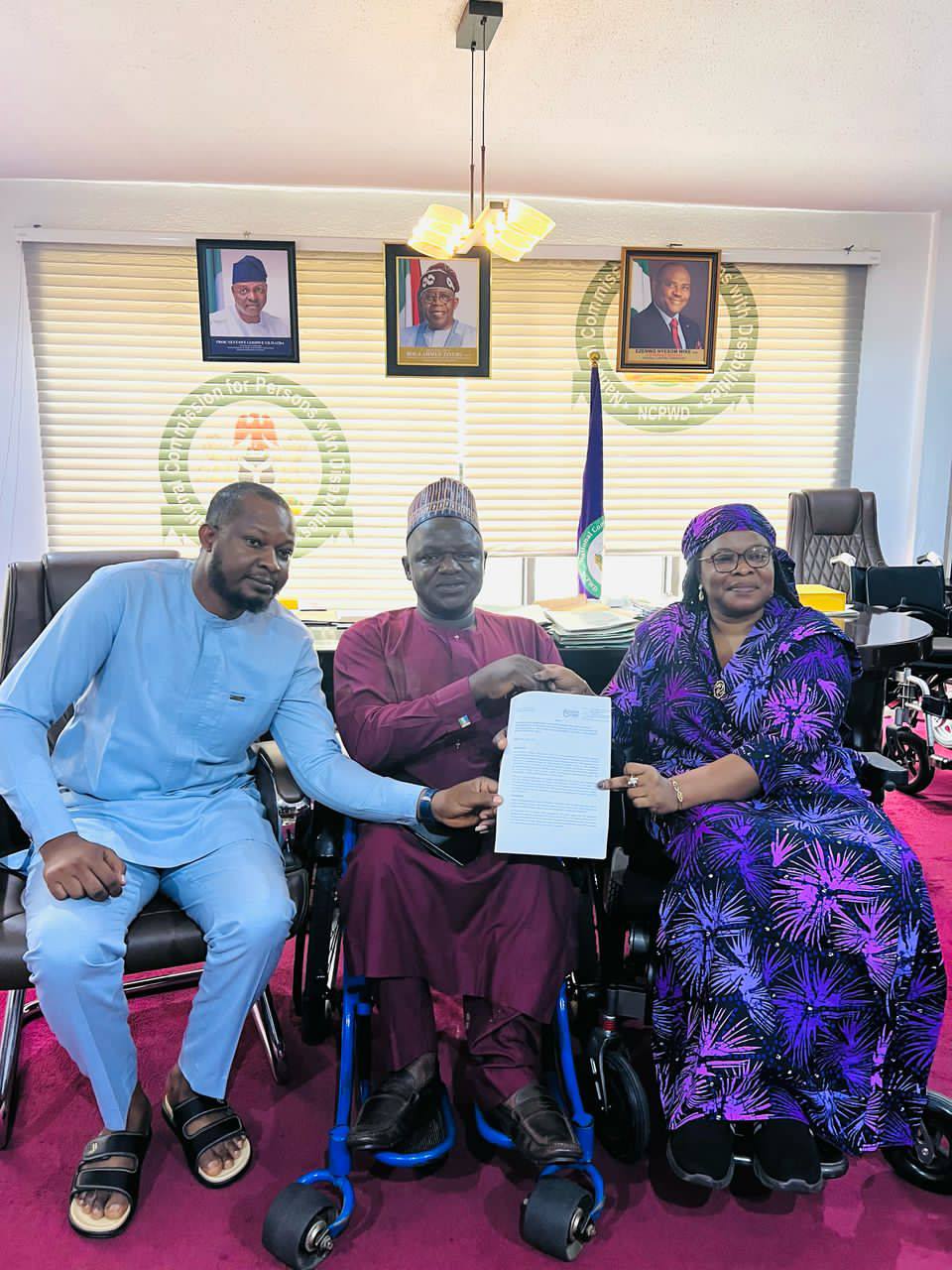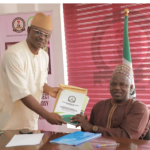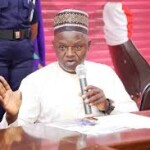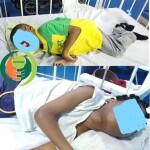Transitory periods over, disability commissions’ executives parry responsibility the best way they can as accessibility becomes impossible to enforce.
By Gideon Oladimeji
The NCPWD executive secretaries threatening fire and brimstone over accessibility has become a ritual. And its observance comes on every convenient courtesy visit.
Ayuba Gufwan did the honors recently during such call. His action simply confirmed the ruse as their stock-in-trade. But critics, including JONAPWD (Lagos) Chairman Salami Lukman and another lawyer, believe the routine reveals bigger problems.
It began in the twilight of James David Lalu’s administration in 2023. Fatima Waziri-Azi, director-general, the National Agency for the Prohibition of Trafficking in Persons, came calling then. The commission’s former boss seized the occasion to proclaim he was letting all hell loose on certain property owners in Abuja. The Discrimination Act 2018 provides for a five-year transitory window to retrofit private and public infrastructure. The window was about to close five months after the visit; many government and private facilities showed no sign the owners gave a hoot about any timeline.
“The law mandated us to seal the organization through law enforcement agencies,” Lalu told the DG. Compliance was no longer a choice. “By the time the law takes its full effect, we will go out with our media and security to make sure every office complies.” At a news conference three months later, he harped on it again, and gave a January-7 deadline. A task force would be in place a month before then.
Gufwan never looked into the file holding the memos. Or else he could have skipped the sabre-rattling session when another caller came late March. During the advocacy visit by the Inclusive Friend Association’s founder Grace Jerry, discussions of the NGO’s Accessibility Compliance Dashboard, an idea she came to bounce off Gufwan, picked up steam. They touched on non-compliance with accessibility provision of the law in Nigeria, and emotions boiled over. The new ES took his turn, and talked up a storm. “Under my leadership, the NCPWD will aggressively pursue the full enforcement of the accessibility laws,” he said.
It was over a year after his predecessor claimed a task force would be in place. Records of buildings the task force has shut down, and corporate bodies prosecuted would indicate seriousness. But none is available. ER request for the details got no response from the commission’s legal department.
The NCPWD and the government lack the political will to enforce the provision, according to an Abuja-based lawyer, Justice Christopher. He said the ES only makes “empty promises” because they and the government they serve lack the interest to enforce it. The resort to the use of rhetoric then renders the transitory period wasted, despite being a provision of an act of the National Assembly.
The period got no better attention at the state level where state assemblies equally provide for it.
Lagos’ Special People Law, the oldest of them all, provides in section 24(5) for a five-year window. The Oyo disability law provides for a year, from the 2021 introduction of the bill; Ekiti, with its Prohibition 2020, provides for five years in section 6; and Jigawa, five years from 2020. Some states, including Kano and Ondo, skip the provision for the transitory period.
The reason might not be far from Christopher’s conclusion—which equally explains why those states that have the period in their disability laws act below expectation. LASODA, for instance, has never made an attempt since the period ended in 2017 in Lagos. Its General Manager Nike Oyewole-Lawal believes the cost of enforcement, especially in the NCPWD fashion, is high. And shutting down offices is no good business, she noted during the last International Women’s Day event at Surulere. Her method is self-advocacy. She asked PWDs to piss in the lobbies of businesses with no accessible toilets. Her Oyo counterpart Ayodeji Adekambi didn’t respond to ER request on his enforcement effort and model since 2022. Ekiti and Jigawa have nothing to show as enforcement blueprint after the period’s expiration either.
Hon. Dawodu Bashir, House Committee chairman on disability, could have shed more light on how the legislation prescribes enforcement to the NCPWD. ER got no response to a request it made to the federal lawmaker.

Not much can the Nigerian disability community actually expect when the commission itself dawdles. Salami blamed the handlers for the failure. “Heads of government agencies for disability at both the national and the subnational levels are not equipped with the knowledge of what PWDs face and the possible solutions,” he told ER. “All they do is write submissions for programmes that won’t serve the community.”
The cost of implementation Nike served up as an excuse didn’t strike Salami as relevant. “For crying out loud, it’s not LASODA’s business to shut down business premises,” he said. Governments have agencies and departments that regulate the construction and building industry; their role in policy formulation and implementation seems, to the lawyer, the missing part. “When an accessible building policy midwifed by LASODA gets contributions from the professionals in physical planning and works ministries, the accessibility provisions will be easy to enforce.” One thing, in his view, makes it so: the MDAs regulating the industry will ensure contractors follow Universal Design even if they get too busy to contemplate disability while designing.
But it’s a different kettle of fish when a disability agency gathers some odds and ends outside of the system to make a policy. “You send it to them [in agencies or departments], and they ignore it, wondering if the drafters know what they are doing,” he said. “But if you make them own the policy, it will be easier to enforce.”
All these failures of the NCPWD, LASODA, and other commissions stem from what Salami described as the absence of functional governing boards. The Discrimination Act and other state laws put in place for every commission a board comprising representatives from key MDAs. The disability agency answers to them. “It’s not the duty of LASODA or the NCPWD to make policies,” he said. That is if their governing boards are up-and-doing—still about the political will, which Christopher said thy lack.
He also considered as unacceptable the excuses of the commission’s handlers, especially Nike’s cost-benefit view. For him, the benefit outweighs the cost, and there are other approaches. “Rather than penalizing non-compliant businesses,” he said, “the government should incentivize those that prioritize accessibility through tax breaks, subsidies or recognition programmes.”
Before the moment of grace elapsed, while the government dangled no stick, the public and the private sectors did little on accessibility. During the period, PWDs couldn’t access over 80 percent of schools in Nigeria. Lalu noted this before he left. Over 90 percent of the healthcare system, too, according to civil society organisations, debarred PWDs. A World Bank’s 2020 report confirmed almost all of the 29 million PWDs in Nigeria then couldn’t access public infrastructure like transportation, public services, and others.
The action and inaction of the disability commissions a year after the transitory period portend despair: accessibility will remain farther out of reach of the PWDs.
The two lawyers who responded to ER in separate interviews agreed that collaboration with stakeholders and sensitization matter. Christopher, however, put some of the blame on the PWDs’ shoulders, too. “Many do not pursue legal actions to test the provisions of the law,” he said. But he claimed he has taken up the challenge: to engage in public interest litigations to enforce accessibility rights.
As JONAPWD’s leader in Lagos, Salami, again, laid it on the line for the disability agencies: Decentralize disability affairs management so each MDA will be disability-inclusive. “Without that it will always be motion without movement,” he said.
Gufwan has fired off some bullet points of action that will drive the aggression he promised to use. Three of them are nothing new: sensitization, legal action and stakeholders’ engagement. The fourth depends on IFA’s accessibility tracker. ER mailed the organization for the link to the website. No response as of the time of publishing this report.
It is likely the NGO’s project is a work in progress.
So Gufwan may have to bottle up his aggression, and delay the mission. Another courtesy caller will swing by before long, and he can do his shadow-punching again.







